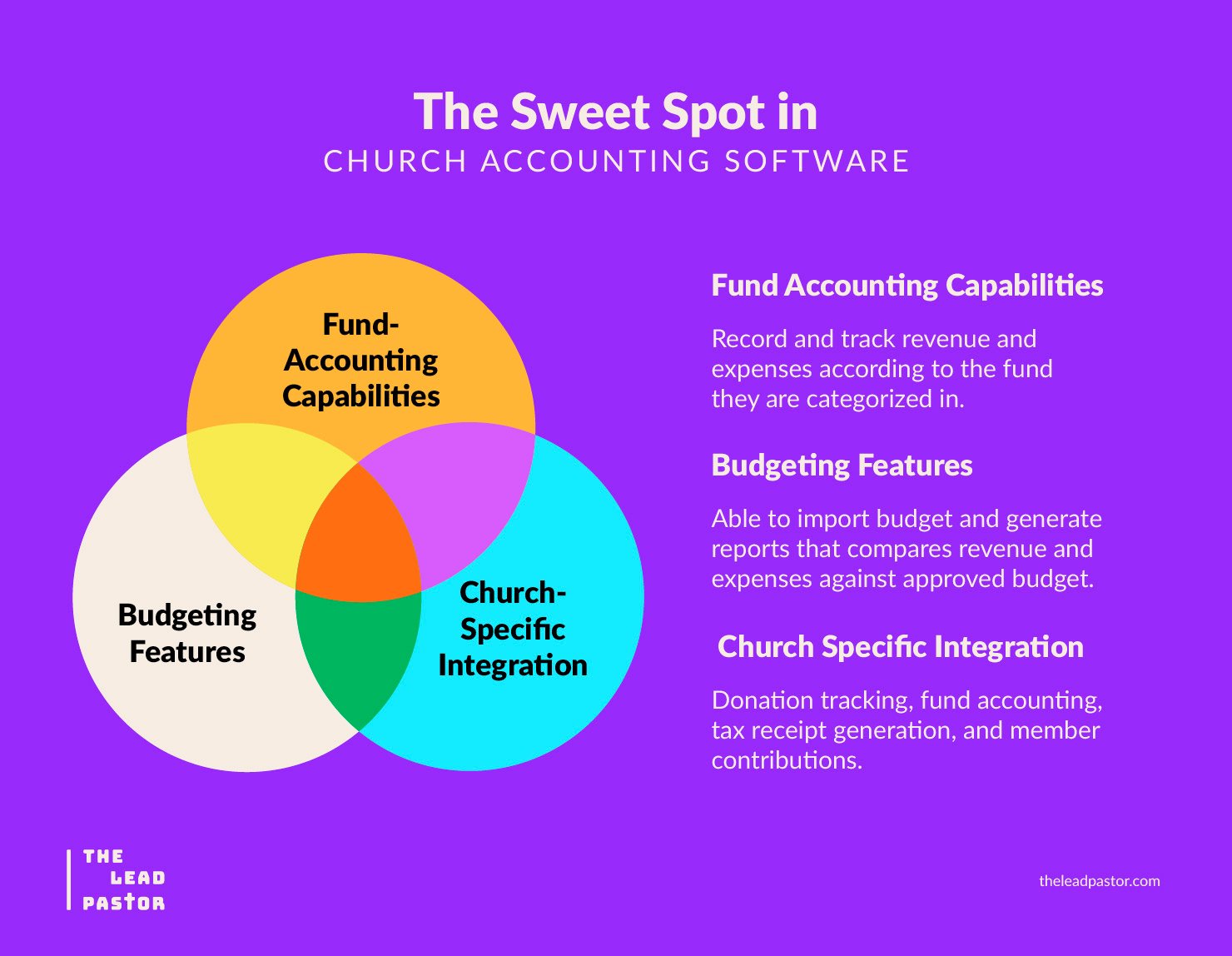Separate church and personal finances immediately: Open a dedicated church bank account and stop using personal accounts for ministry spending—this is foundational for legal protection and clear records.
Use bookkeeping software tools designed for churches: Ditch spreadsheets. Tools like Flockbase or Aplos help track donations, generate reports, and ensure compliance—all in one place.
Get clear on restricted vs. unrestricted funds: Don’t treat all donations the same: if a gift is designated for missions or a building fund, it must be used accordingly—or your church risks legal and ethical fallout.
For churches, bookkeeping is about keeping their financial records clean, organized, and well-maintained.
That being said, it's not just about keeping the numbers straight—it’s about protecting your ministry. Every year, churches struggle (and sometimes shut down) because of financial mismanagement. While most pastors don’t go into ministry to balance spreadsheets, being weak in bookkeeping can lead to massive problems:
- IRS trouble, payroll tax mistakes, or even loss of nonprofit organization status
- Declining donor trust when financial transparency isn’t a priority
- Disorganized records make it impossible to plan for the future
These issues happen when churches rely on outdated systems or untrained volunteers to handle finances. And when financial oversight is weak, the entire ministry is at risk - and that oversight is OUR responsibility.
That’s why I put together this guide—to help you understand bookkeeping for churches in a clear, practical way. You’ll learn what records to track, how to avoid costly mistakes, and whether it’s time to hire a professional.
To start, ensure you're using the best church accounting software tools. They're invaluable in your efforts to streamline bookkeeping and safeguard your church’s finances.
What Is Church Bookkeeping?
Church bookkeeping is a way of tracking, organizing, and managing the church’s financial data to ensure accuracy, transparency, and good financial management.
Why Church Finances Are Different from Business Accounting
Bookkeeping can be straightforward, but it’s not a one-size-fits-all operation. What works for business accounting will not always work when it comes to church finances. Churches are different from businesses because they are a charity that relies mainly on donations from their members. They are required to track all donations and issue receipts to their donors.
Part of good financial stewardship requires your church to use fund accounting for managing and tracking all donations and expenses. This type of accounting separates revenue and expenses into different categories, depending on their use.
Some donations received are designated for specific use and, therefore, need to follow specific guidelines for managing and recording the funds. It ensures accountability and increases the credibility and confidence that church members have in your financial transactions.
Key Church Bookkeeping Principles to Master
Before you take the plunge into church finances, start with a solid foundation built on these principles.
Transparency and Accountability in Church Finances
Maintaining financial integrity is imperative when it comes to bookkeeping. Your donors expect it, and the IRS demands it. Clear record-keeping builds trust within your congregation and can increase donations as a result. Implementing financial best practices improves stewardship of resources.
When your donors trust that their funds will be used with integrity, they will give more freely. The starting point for making sure this is happening is through clear record-keeping. Your financial committee should be regularly reviewing the finances and overseeing the disbursements of funds to prevent fraud or misuse.
Fund Accounting vs. Traditional Accounting
Traditional accounting is focused on measuring profitability by recording the income earned minus the expenses of a company. Next, they produce financial statements: a statement of cash flow, income statement, and the balance sheet. Fund accounting, on the other hand, is centered around tracking and managing how the funds are being used. This is necessary for compliance with the IRS and other government entities.
Fund accounting is useful for churches that have received restricted donations since these donations can only be used for a specific purpose. For example, if a church does a fundraiser to repair the roof of the building, the funds raised are restricted in their use and must be put towards the repair of the roof. They cannot be redirected to other funds, such as missions or general maintenance.

Your Bread & Butter Church Bookkeeping Responsibilities
With your foundation firmly in place, you will find success as you build with these essential bookkeeping components.
Tracking Tithes, Offerings, and Donations
The majority of your income will come through donations, tithes, and offerings. As a registered charity, you need to record these donations accurately and promptly so that you can stay in compliance with government tax requirements. Issuing donation tax receipts is an important part of the bookkeeping role at a church.
While it can be tedious, thankfully, there are many tools available today to help you with this process. There are many options when it comes to donor management software and online giving platforms. It has been shown that providing online giving options can increase the donations that a church receives.
Budgeting for Church Operations (Includes Payroll & Reporting Briefly)
Creating and sticking to an annual budget for church operations is necessary for compliance and maintaining transparency and accountability at your church. Your church finance committee or board of directors are responsible for creating, approving, and maintaining the church budget. Some of the major categories to be accounted for include
- Staff salaries
- Building maintenance, including ongoing upkeep as well as capital improvements
- Ministry expenses and events
- Outreach and evangelism
Discuss with your finance committee how to best communicate the necessary financial statements to your church leaders and the congregation as a whole.
The Best Bookkeeping Software for Your Church
Using the right accounting system will save you valuable time and mean fewer headaches.
Features to Look for in Church Financial Software
Not all bookkeeping software is created equally. Start by identifying which features are a high priority for your church, and then begin your search. Some essential features to get you started include:
- Fund accounting capabilities
- Donation tracking and giving statements
- Church payroll integration that will handle the unique tax situations of clergy and other staff.
- Budgeting features that allow you to generate financial reports for review and comparison

Churches need specialized software instead of generic small-business tools because churches have specific needs and requirements to maintain their charitable status. Going with the cheapest option may not save you in the long run. Check out these nonprofit accounting tools made specifically for churches.
Comparison of the Top 5 Bookkeeping Tools
| Tool | Best For | Trial Info | Price | ||
|---|---|---|---|---|---|
| 1 | Best for ease of use and accessibility | 30-day free trial | From $2/month (for 3 months, then $20/month) | Website | |
| 2 | Best for detailed transaction tracking | Free version available | From $12/month | Website | |
| 3 | Best for an affordable cloud solution | Not available | Pricing is available upon request | Website | |
| 4 | Best all-in-one bookkeeping and church management | Not available | From $25/month (25 givers/50 profiles) | Website | |
| 5 | Best for simple church finance tracking | 14-day free trial | Basic plan costs $15/month, plus plan for $29/month and pro plan for $59/month | Website |
Newbie Church Bookkeeping Mistakes (and How to Avoid ‘Em)
Feeling like a deer in the headlights yet? Don’t worry; mistakes are inevitable, but some can be avoided by learning from these rookie moves.
Mistake: Lack of Financial Oversight
Churches can fall into financial mismanagement due to a lack of oversight. Have your church finance committee conduct monthly financial reviews and regular internal audits. They can make informed decisions and properly oversee the financial health of the church. Things to look out for include
- Reviewing and overseeing proper internal controls
- Checking for the correct usage of designated funds
- Compliance with tax and insurance regulations
- Ensuring the appropriate level of financial transparency.
Mistake: Mixing Personal and Church Funds
Never use church accounts for personal expenses. I know this can happen easily and sometimes without realizing it, especially if you carry a church debit or credit card. But this is a big thing to avoid because it makes the books messy and creates an accounting nightmare. It can erode the trust and integrity of church finances. It can even jeopardize your church’s tax-exempt status.
To avoid all this, make sure to use separate bank accounts for personal and church expenses. Implement financial controls and accountability policies for all church staff who have access to the church bank account.
Mistake: Poor Record-Keeping Practices
Maintaining accurate records requires intentionality. Some common mistakes include missing receipts and not tracking designated funds or donations. Thankfully, these mistakes are easy to avoid when the proper care is taken.
Using a cloud-based accounting software is one great way to help you avoid these issues. They include automated backups and security and remote access for those who need it. Some will store electronic versions of receipts so you always have them in case of an audit. These types of software will often integrate well with donor management and online giving platforms to eliminate the guesswork in tracking and recording donations.
Setting Up a Streamlined Bookkeeping System for Your Church
With these simple steps, you can turn your bookkeeping nightmares into a dream come true.
Step 1: Organize Your Financial Records
As you can see by now, there is a right way and a wrong way to structure your church’s financial records. When setting up your financial records, make sure you use a chart of accounts. This puts your financial data into a simple, readable format, plus your accountant will like you better (and all the people-pleasers said amen).
Use separate bank accounts for your general funds, restricted funds, and savings. This makes it simple to see the financial position of the church at a glance. Make sure your bookkeepers are properly trained and equipped to maintain the records and keep them organized. This may require regular training and continuing education.
Step 2: Track Income and Expenses (the Right Way)
Consistent financial tracking prevents tax and compliance issues. After all, it helps to prevent errors and ensure that the tax forms and filings are submitted on time. This will help to maintain your church’s nonprofit status.
As a church, tracking income and expenses the right way means recording income and expenses according to the fund they belong to. For example, Sunday offerings will usually be allocated to the general fund. This is the largest fund that is used for the regular and ongoing costs of running the church. If you receive a restricted fund donation, such as one for a specific mission area in your church, these donations are categorized to the mission fund and are legally required to be used for that purpose.
Step 3: Prioritize Accountability (and Avoid Fraud)
Putting internal controls and safety measures in place is a good idea. It will protect your church and the people responsible for managing the finances, such as the board of directors and the bookkeepers you are working with. Don’t wait for an incident to happen before implementing these internal controls:
- Dual approval for expenses: Require two signatures for checks and approval of big expenses.
- Regular financial reviews: These should be internal reviews by your finance committee and external reviews or audits by a CPA.
- Restricted access to church funds: Limit who can access the bank accounts and handle cash on behalf of the church.
- Clear cash-handling procedures: Counting the offering should never be a solo act. Have a team of people who are trained in your policies, document the donations, and deposit them promptly into the bank account.
- Digital security: Keep financial records secure and password protected.
Stay on Top of Church Management with Expert Insights
Church bookkeeping isn’t just about numbers—it’s about stewarding your resources wisely so your ministry can thrive. Want more practical financial tips, bookkeeping strategies, and church leadership insights delivered straight to your inbox?
Sign up for our newsletter and get exclusive resources to help your church stay financially strong and mission-focused.












